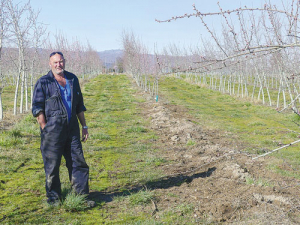MPI launches industry-wide project to manage feral deer
An industry-wide project led by Ministry for Primary Industries (MPI) is underway to deal with the rising number of feral pests, in particular, browsing pests such as deer and pigs.
 Leaning Rock Orchard manager Peter Bennie shows where a small number of trees had to be destroyed because of the import accreditation issue.
Leaning Rock Orchard manager Peter Bennie shows where a small number of trees had to be destroyed because of the import accreditation issue.
Protecting New Zealand’s biosecurity status is paramount in the wrangle over imported American fruit stock, says Summerfruit NZ chair Tim Jones.
Imports from the cultivar supplier Washington University Clean Plant Center Northwest (CPCNW) have been halted and thousands of trees either impounded or already destroyed, after the Ministry for Primary Industries said it could not be sure of their disease status because of non-compliance issues at the US facility.
Growers have challenged MPI in the High Court, which has directed MPI to reconsider and work with growers to develop more appropriate ways of managing its concerns.
Jones, the general manager of the Central Otago cherry orchard company 45 South, says the affair raised several issues.
“From an industry point of view, the most important thing to protect is our biosecurity status, so we took the view that if there is any risk obviously the plants should be destroyed,” he told Rural News.
“The bulk of the growers who had five trees or ten trees said ‘I don’t care, let’s just get rid of them. If there’s a risk let’s get them off the property’.”
However, the court case was taken by growers, such as nurseries, with more money at stake.
“So the industry groups – Summerfruit, Pipfruit – have sat to one side while that court case has been going on, just to see exactly where that’s going to shake out,” Jones says.
“Growers are saying to us ‘biosecurity is paramount, so we need to go into bat for them’.”
He says Summerfruit NZ would be “more than happy” for the impounded trees to be released if there was proved to be no risk.
Many of the affected trees have already been destroyed. Leaning Rock Orchard, Alexandra, had trial numbers of new varieties amounting to about a couple of dozen trees in total.
Orchard manager Peter Bennie, indicating the gaps in the rows where trees were lifted and burned, emphasised that he was not criticising the way MPI handled the matter.
Jones says the bigger issue for the future is how to maintain a steady pathway of new genetic material coming into NZ.
“This is closing the border at the moment for new stuff to come in. We’ve got an outdated import health standard that needs to be rebuilt so we can use modern technology.”
CPCNW is now saying it’s not interested in seeking re-accreditation for the NZ market. “That’s a concern, not just for summerfruit, but for pipfruit and any plant material that might be coming from that facility into NZ.”
Jones told Rural News that the problem for NZ is that it’s so small a market that suppliers find it uneconomic to deal with our accreditation requirements.
“We fight that... with chemical companies, for example – fungicides, insecticides, that sort of thing. We’re such a small market that the cost of registration is prohibitive.”
Grace Su, a recent optometry graduate from the University of Auckland, is moving to Tauranga to start work in a practice where she worked while participating in the university's Rural Health Interprofessional Programme (RHIP).
Two farmers and two farming companies were recently convicted and fined a total of $108,000 for environmental offending.
According to Ravensdown's most recent Market Outlook report, a combination of geopolitical movements and volatile market responses are impacting the global fertiliser landscape.
Environment Canterbury, alongside industry partners and a group of farmers, is encouraging farmers to consider composting as an environmentally friendly alternative to offal pits.
A New Zealand dairy industry leader believes the free trade deal announced with India delivers wins for the sector.
The Coalition Government will need the support of at least one opposition party to ratify the free trade deal with India.

OPINION: The release of the Natural Environment Bill and Planning Bill to replace the Resource Management Act is a red-letter day…
OPINION: Federated Farmers has launched a new campaign, swapping ‘The Twelve Days of Christmas’ for ‘The Twelve Pests of Christmas’ to…